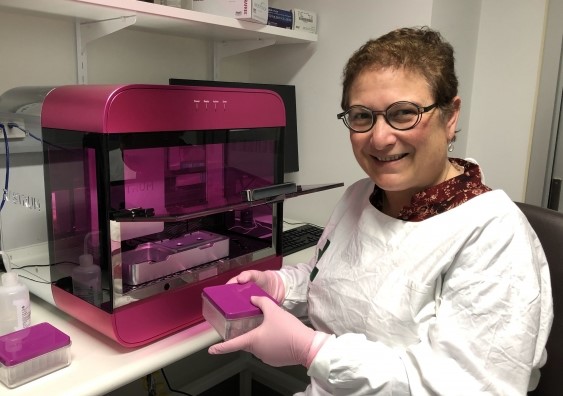3D bioprinter wins prestigious idea award
A 3D printer that can print replicas of cells for research into medical drug discovery has won a major idea award.
A 3D printer that can print replicas of cells for research into medical drug discovery has won a major idea award.

A 3D bioprinter that can print replicas of tumours has won a prestigious Fast Company’s 2020 World Changing Ideas Award. The printer was co-designed by two leading UNSW medical and science academics.
The prize was awarded to Inventia Rastrum, a biomedical company that worked in collaboration with UNSW Sydney’s Australian Centre for Nanomedicine (ACN) co-directors, Professor Justin Gooding and Professor Maria Kavallaris, to develop printer inks and cell biology components.
Fast Company’s World Changing Ideas Awards honour the businesses and organisations driving change in the world. This year Inventia Rastrum won the experimental category for the 3D printer.
The 3D printer gives biomedical researchers and tissue engineers a fast way to create 3D cell structures, proteins and tumour models.
Professor Maria Kavallaris, Head of the Tumour Biology and Targeting Program at Children's Cancer Institute, developed the cell biology behind the printer, analysed the viabilities of cells, how quickly they divide and developed accurate tumour like environments.
“It has been an absolute privilege to have been part of the team at the Children’s Cancer Institute and UNSW Sydney involved in developing the 3D bioprinter that has wide reaching applications in cancer and other diseases as well as tissue engineering,” Professor Kavallaris said.
Scientia Professor Gooding from UNSW's School of Chemistry said: “The type of ink developed for the printer means cell biologists for the first time have the capability to precisely deposit multiple cell types in a single 3D cell culture. They will also be able to control the proteins that binds cells together. This is critical because it allows cancer researchers to better understand the variables in cancer formation.”
“With the first printers having been sold, we are seeing the promise of this technology being able to revolutionise how cell biology is done, beginning to be realised. Initial biomedical studies are showing that the control the bioprinter brings is being pivotal to researchers acquiring new fundamental understanding in cancer biology,” Professor Gooding continued.
Funding for the printer was secured in 2013 through an ARC linkage grant and the first models were built in 2016. The printer went through a thorough a rigorous design and testing period from both the engineering and cell biology perspective.
This year the Children’s Cancer Institute received funding through a Cancer Australia grant to study the 3D bioprinting technology towards the development and identification of effective therapies for aggressive childhood cancers.
The Australian Centre for NanoMedicine (ACN) combines Medicine, Science and Engineering to deliver therapeutic solutions to research problems in medicine. ACN is a hub for nanomedicine research in Australia and through a commitment to research, education, knowledge transfer and commercialisation, ACN is dedicated to the prevention, diagnosis and curing of diseases, especially hard to treat diseases.
The 3D bioprinter also won the prestigious 2019 Good Design Award of the Year.